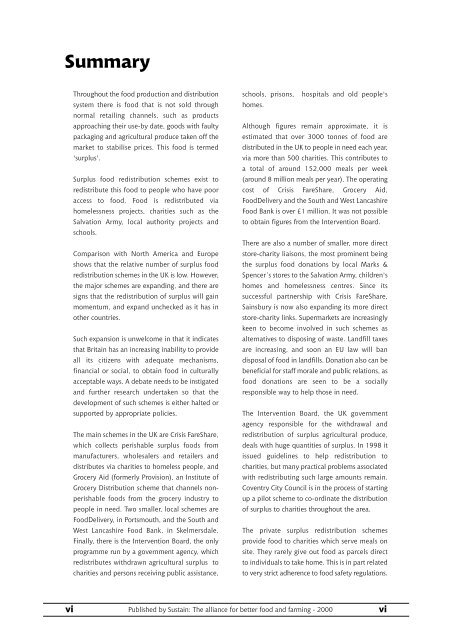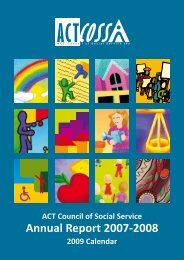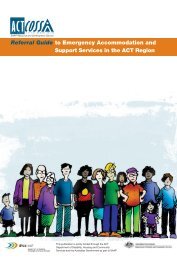Too much and too little? Debates on surplus food redistribution
Too much and too little? Debates on surplus food redistribution
Too much and too little? Debates on surplus food redistribution
Create successful ePaper yourself
Turn your PDF publications into a flip-book with our unique Google optimized e-Paper software.
Summary<br />
l Throughout the <strong>food</strong> producti<strong>on</strong> <str<strong>on</strong>g>and</str<strong>on</strong>g> distributi<strong>on</strong><br />
system there is <strong>food</strong> that is not sold through<br />
normal retailing channels, such as products<br />
approaching their use-by date, goods with faulty<br />
packaging <str<strong>on</strong>g>and</str<strong>on</strong>g> agricultural produce taken off the<br />
market to stabilise prices. This <strong>food</strong> is termed<br />
'<strong>surplus</strong>'.<br />
l Surplus <strong>food</strong> redistributi<strong>on</strong> schemes exist to<br />
redistribute this <strong>food</strong> to people who have poor<br />
access to <strong>food</strong>. Food is redistributed via<br />
homelessness projects, charities such as the<br />
Salvati<strong>on</strong> Army, local authority projects <str<strong>on</strong>g>and</str<strong>on</strong>g><br />
schools.<br />
l Comparis<strong>on</strong> with North America <str<strong>on</strong>g>and</str<strong>on</strong>g> Europe<br />
shows that the relative number of <strong>surplus</strong> <strong>food</strong><br />
redistributi<strong>on</strong> schemes in the UK is low. However,<br />
the major schemes are exp<str<strong>on</strong>g>and</str<strong>on</strong>g>ing, <str<strong>on</strong>g>and</str<strong>on</strong>g> there are<br />
signs that the redistributi<strong>on</strong> of <strong>surplus</strong> will gain<br />
momentum, <str<strong>on</strong>g>and</str<strong>on</strong>g> exp<str<strong>on</strong>g>and</str<strong>on</strong>g> unchecked as it has in<br />
other countries.<br />
l Such expansi<strong>on</strong> is unwelcome in that it indicates<br />
that Britain has an increasing inability to provide<br />
all its citizens with adequate mechanisms,<br />
financial or social, to obtain <strong>food</strong> in culturally<br />
acceptable ways. A debate needs to be instigated<br />
<str<strong>on</strong>g>and</str<strong>on</strong>g> further research undertaken so that the<br />
development of such schemes is either halted or<br />
supported by appropriate policies.<br />
l The main schemes in the UK are Crisis FareShare,<br />
which collects perishable <strong>surplus</strong> <strong>food</strong>s from<br />
manufacturers, wholesalers <str<strong>on</strong>g>and</str<strong>on</strong>g> retailers <str<strong>on</strong>g>and</str<strong>on</strong>g><br />
distributes via charities to homeless people, <str<strong>on</strong>g>and</str<strong>on</strong>g><br />
Grocery Aid (formerly Provisi<strong>on</strong>), an Institute of<br />
Grocery Distributi<strong>on</strong> scheme that channels n<strong>on</strong>perishable<br />
<strong>food</strong>s from the grocery industry to<br />
people in need. Two smaller, local schemes are<br />
FoodDelivery, in Portsmouth, <str<strong>on</strong>g>and</str<strong>on</strong>g> the South <str<strong>on</strong>g>and</str<strong>on</strong>g><br />
West Lancashire Food Bank, in Skelmersdale.<br />
Finally, there is the Interventi<strong>on</strong> Board, the <strong>on</strong>ly<br />
programme run by a government agency, which<br />
redistributes withdrawn agricultural <strong>surplus</strong> to<br />
charities <str<strong>on</strong>g>and</str<strong>on</strong>g> pers<strong>on</strong>s receiving public assistance,<br />
schools, pris<strong>on</strong>s, hospitals <str<strong>on</strong>g>and</str<strong>on</strong>g> old people's<br />
homes.<br />
l Although figures remain approximate, it is<br />
estimated that over 3000 t<strong>on</strong>nes of <strong>food</strong> are<br />
distributed in the UK to people in need each year,<br />
via more than 500 charities. This c<strong>on</strong>tributes to<br />
a total of around 152,000 meals per week<br />
(around 8 milli<strong>on</strong> meals per year). The operating<br />
cost of Crisis FareShare, Grocery Aid,<br />
FoodDelivery <str<strong>on</strong>g>and</str<strong>on</strong>g> the South <str<strong>on</strong>g>and</str<strong>on</strong>g> West Lancashire<br />
Food Bank is over £1 milli<strong>on</strong>. It was not possible<br />
to obtain figures from the Interventi<strong>on</strong> Board.<br />
l There are also a number of smaller, more direct<br />
store-charity liais<strong>on</strong>s, the most prominent being<br />
the <strong>surplus</strong> <strong>food</strong> d<strong>on</strong>ati<strong>on</strong>s by local Marks &<br />
Spencer’s stores to the Salvati<strong>on</strong> Army, children's<br />
homes <str<strong>on</strong>g>and</str<strong>on</strong>g> homelessness centres. Since its<br />
successful partnership with Crisis FareShare,<br />
Sainsbury is now also exp<str<strong>on</strong>g>and</str<strong>on</strong>g>ing its more direct<br />
store-charity links. Supermarkets are increasingly<br />
keen to become involved in such schemes as<br />
alternatives to disposing of waste. L<str<strong>on</strong>g>and</str<strong>on</strong>g>fill taxes<br />
are increasing, <str<strong>on</strong>g>and</str<strong>on</strong>g> so<strong>on</strong> an EU law will ban<br />
disposal of <strong>food</strong> in l<str<strong>on</strong>g>and</str<strong>on</strong>g>fills. D<strong>on</strong>ati<strong>on</strong> also can be<br />
beneficial for staff morale <str<strong>on</strong>g>and</str<strong>on</strong>g> public relati<strong>on</strong>s, as<br />
<strong>food</strong> d<strong>on</strong>ati<strong>on</strong>s are seen to be a socially<br />
resp<strong>on</strong>sible way to help those in need.<br />
l The Interventi<strong>on</strong> Board, the UK government<br />
agency resp<strong>on</strong>sible for the withdrawal <str<strong>on</strong>g>and</str<strong>on</strong>g><br />
redistributi<strong>on</strong> of <strong>surplus</strong> agricultural produce,<br />
deals with huge quantities of <strong>surplus</strong>. In 1998 it<br />
issued guidelines to help redistributi<strong>on</strong> to<br />
charities, but many practical problems associated<br />
with redistributing such large amounts remain.<br />
Coventry City Council is in the process of starting<br />
up a pilot scheme to co-ordinate the distributi<strong>on</strong><br />
of <strong>surplus</strong> to charities throughout the area.<br />
l The private <strong>surplus</strong> redistributi<strong>on</strong> schemes<br />
provide <strong>food</strong> to charities which serve meals <strong>on</strong><br />
site. They rarely give out <strong>food</strong> as parcels direct<br />
to individuals to take home. This is in part related<br />
to very strict adherence to <strong>food</strong> safety regulati<strong>on</strong>s.<br />
vi Published by Sustain: The alliance for better <strong>food</strong> <str<strong>on</strong>g>and</str<strong>on</strong>g> farming - 2000<br />
vi













